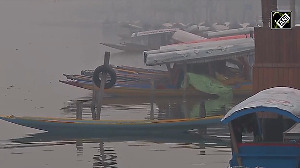The Obama Administration has indicated that it apparently has no problem with India training Afghan security forces but that is a sovereign decision to be taken by the government in Kabul, Washington is aware that such training of Afghans by India is already taking place.
A top Pentagon official, Michele Flournoy, Under Secretary of Defence for Policy, during an interaction that followed her speech on "Investing in the Future of US-India Defence Relations," asked if the US would have any qualms over India training Afghanistan's security forces because India has the wherewithal to do it despite the paranoia of Pakistan, said, "We are very supportive of the Afghan military and police taking advantage of international offers to provide professional military education and training to their security forces. But, she added, "Obviously, it's an Afghan decision in terms of which of those opportunities Kabul wants to take advantage of."
Flournoy however pointed out that "I understand that there already are a number of Afghans training in India and benefiting greatly given the professionalism of the Indian military and what they can provide. So, we are very supportive of that effort."
Addressing the overwhelming concern both in US Congressional circles among the likes of Senator John McCain, Arizona Republican and the ranking member of the Senate Armed Services Committee and countries like India of a premature withdrawal of US troops from Afghanistan before the Al-Qaeda and the resurgent Taliban are defeated, Flournoy attempted to allay these fears, saying that this was not the intent of President Obama's July 2011 deadline for withdrawal of American forces.
She asserted that the President had made clear that there was "an enduring US commitment to the region," and that "we have learned our lessons from history. We have no plans to depart the region and to abandon Afghanistan anytime soon. Everything has to be seen in the context of a long-term commitment to both the security and development of Afghanistan."
Flournoy acknowledged that President Obama has "identified July 2011, as an inflection point in our strategy, when the surge of forces would end, and the beginning of a process of transition would begin, based on the conditions on the ground."
In response to another question if India and Pakistan were working at cross-purposes in Afghanistan and complicating the Obama administration's efforts, Flournoy said, "Certainly, given the historic tensions between India and Pakistan, both countries tend to view Afghanistan through that prism."
"We are very supportive of any steps that the Indians and Pakistani government choose to take to deal with the issues directly between them and to reduce tensions and build confidence," Flournoy said.
"But in Afghanistan," she argued, "I would sort of separate the two countries," and once again lauded New Delhi's role in Afghanistan, saying, "India has played a very important role in economic and social development in Afghanistan in multiple sectors and we would like to see them continue to play that role."
She said in this regard, "We have strategic partnerships with all three countries--India, Pakistan and Afghanistan--and one of the things we continue to try to press is our belief that that common stake in regional security can actually bring them to a place of cooperation that they've not experienced before, but tt's not going to be easy to get there."





